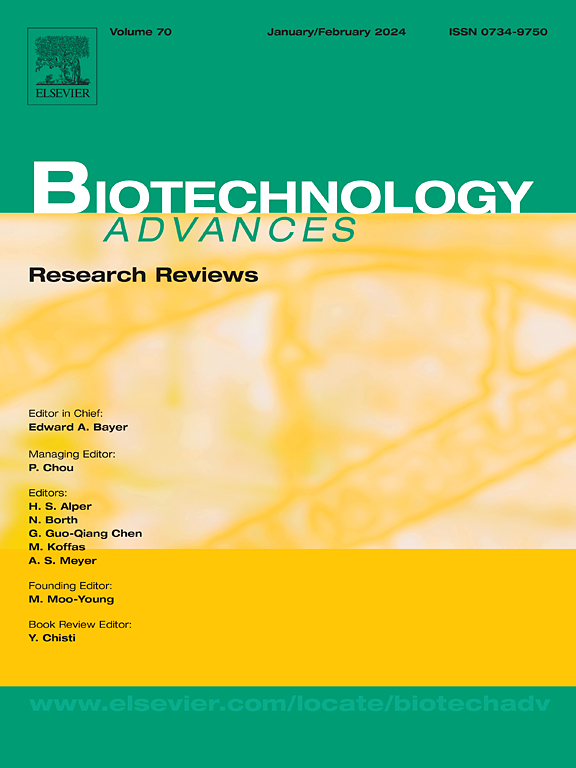Metagenomics and plant-microbe symbioses: Microbial community dynamics, functional roles in carbon sequestration, nitrogen transformation, sulfur and phosphorus mobilization for sustainable soil health
IF 12.1
1区 工程技术
Q1 BIOTECHNOLOGY & APPLIED MICROBIOLOGY
引用次数: 0
Abstract
Biogeochemical cycles are fundamental processes that regulate the flow of essential elements such as carbon, nitrogen, and phosphorus, sustaining ecosystem productivity and global biogeochemical equilibrium. These cycles are intricately influenced by plant-microbe symbioses, which facilitate nutrient acquisition, organic matter decomposition, and the transformation of soil nutrients. Through mutualistic interactions, plants and microbes co-regulate nutrient availability and promote ecosystem resilience, especially under environmental stress. Metagenomics has emerged as a transformative tool for deciphering the complex microbial communities and functional genes driving these cycles. By enabling the high-throughput sequencing and annotation of microbial genomes, metagenomics provides unparalleled insights into the taxonomic diversity, metabolic potential, and functional pathways underlying microbial contributions to biogeochemical processes. Unlike previous reviews, this work integrates recent advancements in metagenomics with complementary omics approaches to provide a comprehensive perspective on how plant-microbe interactions modulate biogeochemical cycles at molecular, genetic, and ecosystem levels. By highlighting novel microbial processes and potential biotechnological applications, this review aims to guide future research in leveraging plant-microbe symbioses for sustainable agriculture, ecosystem restoration, and climate change mitigation.
宏基因组学和植物-微生物共生:微生物群落动态,在碳固存、氮转化、硫和磷动员中可持续土壤健康的功能作用
生物地球化学循环是调节碳、氮、磷等基本元素流动,维持生态系统生产力和全球生物地球化学平衡的基本过程。这些循环受到植物-微生物共生关系的复杂影响,共生关系促进养分获取、有机物分解和土壤养分转化。通过相互作用,植物和微生物共同调节养分有效性,促进生态系统的恢复力,特别是在环境胁迫下。宏基因组学已经成为一种变革性的工具,用于破译复杂的微生物群落和驱动这些循环的功能基因。通过实现微生物基因组的高通量测序和注释,宏基因组学为微生物对生物地球化学过程的贡献提供了无与伦比的分类多样性、代谢潜力和功能途径。与以往的综述不同,本研究将宏基因组学的最新进展与互补组学方法相结合,为植物-微生物相互作用如何在分子、遗传和生态系统水平上调节生物地球化学循环提供了一个全面的视角。通过强调新的微生物过程和潜在的生物技术应用,本综述旨在指导未来利用植物-微生物共生促进可持续农业、生态系统恢复和减缓气候变化的研究。
本文章由计算机程序翻译,如有差异,请以英文原文为准。
求助全文
约1分钟内获得全文
求助全文
来源期刊

Biotechnology advances
工程技术-生物工程与应用微生物
CiteScore
25.50
自引率
2.50%
发文量
167
审稿时长
37 days
期刊介绍:
Biotechnology Advances is a comprehensive review journal that covers all aspects of the multidisciplinary field of biotechnology. The journal focuses on biotechnology principles and their applications in various industries, agriculture, medicine, environmental concerns, and regulatory issues. It publishes authoritative articles that highlight current developments and future trends in the field of biotechnology. The journal invites submissions of manuscripts that are relevant and appropriate. It targets a wide audience, including scientists, engineers, students, instructors, researchers, practitioners, managers, governments, and other stakeholders in the field. Additionally, special issues are published based on selected presentations from recent relevant conferences in collaboration with the organizations hosting those conferences.
 求助内容:
求助内容: 应助结果提醒方式:
应助结果提醒方式:


